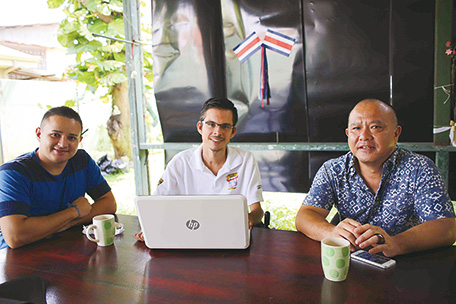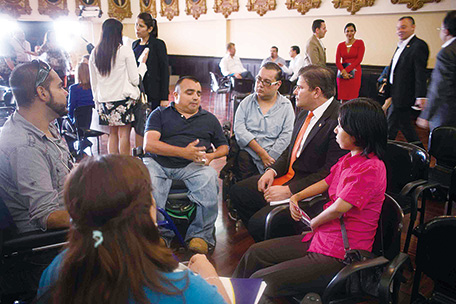Stories from the field 08
Working in Tandem to Promote Social Participation
– Assistance Provided by a Japanese NPO for Persons with Disabilities in Costa Rica to Lead Independent Lives

Mr. Luis Cambronero (center) and Mr. Takeshi Inoue (right) drink coffee sold by the Morpho Center for Independent Living as they hold a management meeting. (Photo: Takeshi Inoue)
The year 1981 was designated as the International Year of Disabled Persons, and in response, the international community has reinforced initiatives for persons with disabilities, with the ultimate objective of enabling all people, regardless of whether or not they have disabilities, to lead safe and comfortable lives. Nevertheless, various issues remain unresolved pertaining to systems, finances, and social understanding for the needs of persons with disabilities by persons without disabilities. It is therefore difficult in many countries to assert that the social inclusion of disabled persons has been sufficiently realized.
Against this backdrop, the Central American nation of Costa Rica is working to enact groundbreaking legislation, the Act for the Promotion of the Independence of Persons with Disabilities, which will stipulate the establishment of a system for the dispatch of personal assistants to support persons with disabilities. This law, which was formulated with the objective of building the necessary systems to enable persons with disabilities to lead self-determined lives, will become the first of its kind in Central and South America if passed by the Parliament of Costa Rica. Initiatives supporting the enactment of the law are led by Mr. Luis Cambronero, who has worked in tandem with Japanese staff, with assistance from the Japanese government, to support persons with disabilities in Costa Rica to lead independent lives.
Mr. Cambronero injured his cervical spine in an accident in 2003, at the age of 20, and became confined to a wheelchair, needing assistance even with bathing and using the bathroom. Costa Rica enacted the Equal Opportunity Act for Persons with Disabilities in May 1996. Many persons with disabilities, however, still rely on nursing care provided by family members at home, and the burden on their families and their isolation from society are significant problems. Mr. Cambronero, too, was unable to continue working and shut himself in at home for a prolonged period.
However, Mr. Cambronero attended local events to promote social participation among persons with disabilities that was held as part of the Reinforcement of the Integral System of Rehabilitation with Community Participation in Brunca Region of Republic of Costa Rica, with focus on Human Security Project, a project implemented by the Japan International Cooperation Agency (JICA) from 2007 through 2012. Afterwards, Mr. Cambronero gradually began to regain interest in the rest of society.
In 2009, Mr. Cambronero and six other persons with disabilities from Central and South America participated in Independent Living Activity of Persons with Disabilities in Central and South American Countries, a JICA training program conducted in Japan from 2007 through 2013. The objective of the program is to provide assistance for initiatives carried out by persons with disabilities for persons with disabilities in developing nations to lead independent lives. The implementing partner in this program was Mainstream Association, an NPO in Hyogo Prefecture. During the six weeks of training, the participants stayed in the homes of persons with disabilities who lived alone while receiving assistance, and visited various spots in Kobe accompanied by personal assistants. This hands-on learning experience inspired a significant change in Mr. Cambronero’s views.
“In Japan, urban and community development is implemented in a manner that means that persons with disabilities are freely able to go shopping using their wheelchairs. There are also persons with severe disabilities who go to pubs and enjoy karaoke with the help of personal assistants. Disability does not automatically mean lack of freedom. If we build our communities barrier-free, like Kobe City, and establish appropriate systems for the provision of care, persons with disabilities could live freely,” comments Mr. Cambronero.

Management staff members of Morpho appeal to parliament members to support urban development and community building that enable independent living of people with disabilities and to pass the Act for Promotion of Independence of Persons with Disabilities. (Photo: Takeshi Inoue)
After returning to Costa Rica, Mr. Cambronero attended various events organized by JICA for the independent living of persons with disabilities, where he held discussions with acquaintances and together nurtured ideas about independent living and social participation by persons with disabilities. The Center for Independent Living “Morpho” was eventually established in 2011 as a hub for their activities. In 2013, Mr. Cambronero assumed the post of its director, and the center launched large-scale social activities implemented by persons with disabilities.
“Promoting Independent Living in Costa Rica,” JICA Partnership Program,1 was initiated in April 2012. Under this project, members of Mainstream Association, the Hyogo Prefecture NPO that previously provided training to Mr. Cambronero and other persons with disabilities, offers indirect support to the Center for Independent Living “Morpho” for the recruitment and training of personal assistants, in negotiations with government agencies, and other areas.
Mr. Takeshi Inoue, the Project Manager of “Promoting Independent Living in Costa Rica,” recalls that the activities implemented under this project brought a change to Mr. Cambronero. Quiet and seemingly passive in the beginning, he came into his own after assuming a position of responsibility, and proceeded to become a true leader who did not shy away from challenges.
Mr. Inoue says, “In order to realize the social participation of persons with disabilities, rather than an arrangement in which we are supported by those without disabilities, it is instead essential for us to develop the capacity to improve our own environment and reach out to the government.”
The various activities implemented by Mr. Cambronero and his fellow members of the Center for Independent Living “Morpho” are producing concrete results. Today, 100% of the buses that operate in Pérez Zeledón, the city where “Morpho” is located, are barrier-free. Initiatives for the enactment of the Act for the Promotion of the Independence of Persons with Disabilities are also gaining momentum. Costa Rica is leading the efforts of Latin America and the Caribbean Region for urban and community development by and for persons with disabilities.
As for his ambitions for the future, Mr. Cambronero has expressed his intention to leverage the initiatives started in Costa Rica and expand this movement to other Central and South American countries. He also hopes to empower many persons with disabilities to realize their own potential. Inspired by assistance provided by Japan, Mr. Cambronero and his team took action to realize the independence of persons with disabilities, and now they face a challenge that continues to grow.
*1 For more information, see Glossary.
<< Previous Page Next Page >>
Main Text | Statistics and Reference Materials | Stories from the field | Master Techniques, From Japan to the World | ODA Topics
